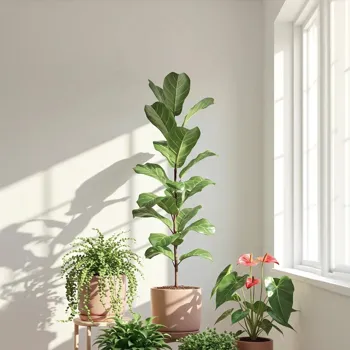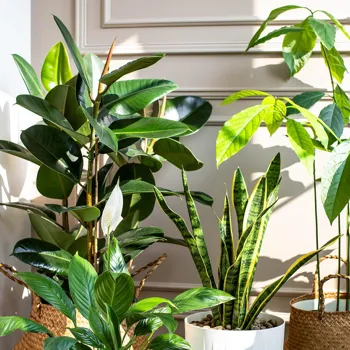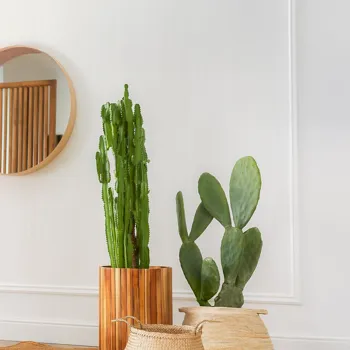Discover 10 budget-friendly ways to create a sustainable home in India. Easy tips to save money and the planet!
In today's world, 'sustainability' is the buzzword. Everyone's talking about it, from big
corporations to your neighbour next door. But often, people think going green means spending a lot of green, which is simply not true!

You can easily make your home more eco-friendly without emptying your wallet. Small changes in your daily habits and choices can make a big difference for the planet and even save you some money in the long run.
Let's dive into ten practical and budget-friendly ways to create a more sustainable home right here in India.
Switch to LED bulbs and maximize natural light for energy savings
Firstly, let's talk about lighting. Switching to LED bulbs is one of the simplest and most effective ways to reduce your energy consumption. They use significantly less electricity than traditional incandescent bulbs and last much longer too.

While the initial cost might be slightly higher, the long-term savings on your electricity bill are substantial. Plus, LEDs come in various colours and brightness levels, so you can easily find the perfect fit for every room in your house.
Think about it – replacing just a few bulbs can have a noticeable impact on your energy usage, helping you shrink your carbon footprint and keep your wallet happy. Another smart move is to make the most of natural light.
Open your curtains and blinds during the day to brighten up your home naturally. This not only reduces your reliance on artificial lighting but also improves your mood and overall well-being. You can even strategically place mirrors to reflect sunlight and brighten up darker corners of your home.
By harnessing the power of the sun wisely, you can create a more cheerful and energy-efficient living space without spending a single rupee.
Conserve water by fixing leaks, using low-flow fixtures, and collecting rainwater
Next, consider your water consumption. Water is a precious resource, and it's important to use it wisely. Start by fixing any leaky faucets or pipes promptly. Even a small drip can waste a significant amount of water over time.

You'd be surprised how much water is simply going down the drain, literally! Install low-flow showerheads and faucet aerators to reduce water usage without compromising water pressure. These devices mix air with water, providing a comfortable flow while using less water overall.
When washing dishes, avoid letting the water run continuously. Fill up the sink with soapy water for washing and another with clean water for rinsing. When you're brushing your teeth, turn off the tap while you're brushing, and only turn it on when you need to rinse.
And if you have a garden, collect rainwater in a large container to use for watering plants. Rainwater is naturally soft and free of chemicals, making it ideal for your plants. Plus, you'll be reducing your reliance on treated water.
Reduce waste by cutting single-use plastics, composting, and recycling
Waste reduction is another crucial aspect of sustainable living. Start by reducing your consumption of single-use plastics. Carry your own reusable shopping bags, water bottles, and coffee cups when you're out and about. Say no to plastic straws and cutlery whenever possible.
When shopping, opt for products with minimal packaging or those packaged in recyclable materials. Buying in bulk can also help reduce packaging waste. Composting is a fantastic way to reduce food waste and create nutrient-rich soil for your garden.
You can easily set up a compost bin in your backyard or even use a small composting system indoors. Vegetable scraps, fruit peels, coffee grounds, and tea bags can all be composted. And of course, recycle everything you can.
Familiarize yourself with your local recycling guidelines and make sure you're sorting your waste properly. Recycling not only reduces landfill waste but also conserves resources and energy.
Unplug electronics, use energy-efficient appliances, air-dry clothes, and use fans in summer
Moving on to energy efficiency, unplug electronic devices when they're not in use. Many electronics continue to draw power even when they're turned off, a phenomenon known as "phantom load.
" Unplug chargers, TVs, and other devices when you're not using them to save energy and reduce your electricity bill. Invest in energy-efficient appliances when it's time to replace your old ones.
Look for appliances with a high energy star rating, indicating that they consume less energy than standard models. Use your washing machine and dishwasher only when they're fully loaded. Running partially filled machines wastes water and energy.
And whenever possible, air-dry your clothes instead of using a dryer. This not only saves energy but also helps your clothes last longer. In summers, make good use of fans instead of just switching the ACs.
Enhance home sustainability with plants, eco-friendly cleaning products
Enhancing the sustainability of your home can involve a number of small, manageable changes. First, embrace the power of plants! Indoor plants not only add beauty to your home but also purify the air by absorbing pollutants and releasing oxygen.

Choose plants that are known for their air-purifying qualities, such as snake plants, spider plants, and peace lilies. Arrange plants where they are exposed to sun, for optimum results. Consider using eco-friendly cleaning products.
Many conventional cleaning products contain harsh chemicals that can be harmful to your health and the environment. Opt for natural cleaning alternatives like vinegar, baking soda, and lemon juice. These ingredients are effective at cleaning and disinfecting without the harmful side effects.
Be mindful of consumption habits for a sustainable lifestyle
Finally, be mindful of your consumption habits. Before making a purchase, ask yourself if you really need it. Avoid impulse buys and opt for quality items that will last longer. Repair rather than replace broken items whenever possible. Consider buying used or secondhand items instead of new ones.
This is a great way to save money and reduce your environmental impact. Support local and sustainable businesses. When you shop locally, you're supporting your community and reducing the environmental impact of transportation.
Choose products that are made from sustainable materials and produced using ethical practices. Remember, every small step you take towards a more sustainable lifestyle can make a big difference for the planet.
By implementing these simple and budget-friendly tips, you can create a more eco-friendly home that benefits both you and the environment.
Embrace change for a sustainable future
Remember! making a change is better than making no change! Let's all strive to live a more sustainable life, together.














